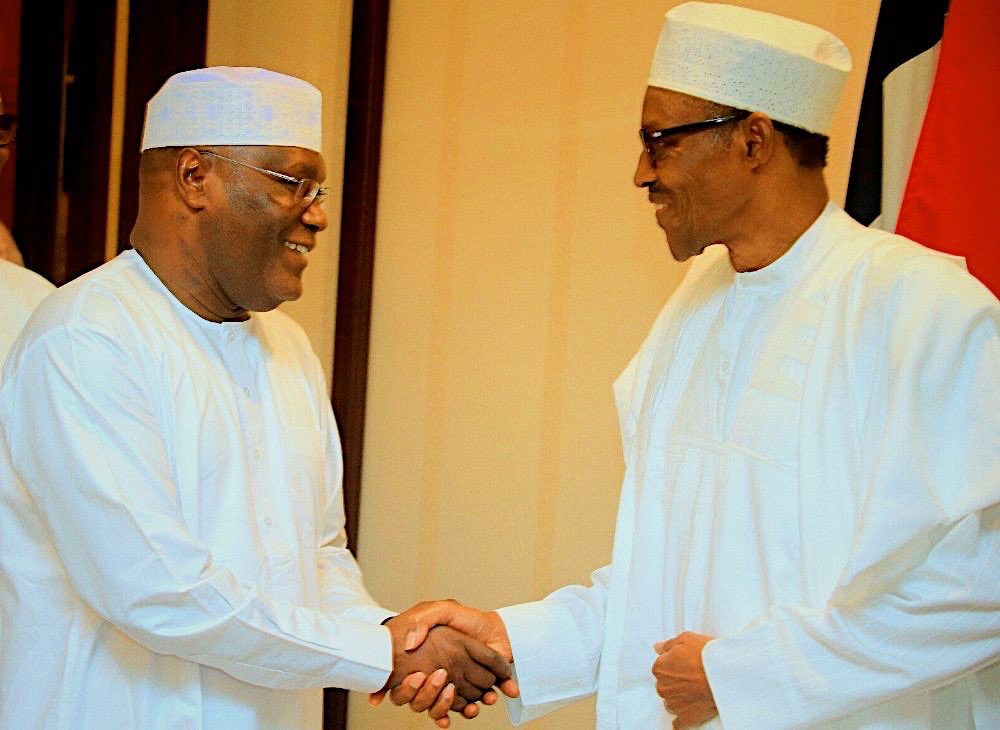This post has already been read 2202 times!
President Muhammadu Buhari has responded to allegations in the petition by Atiku Abubakar and his party, the People’s Democratic Party (PDP), before the Presidential Election Tribunal.
Buhari, in a response filed on Tuesday by a team of lawyers led by Wole Olanipekun (SAN), debunked Atiku’s and PDP’s claim that he was not qualified to run for President.
The President said he was far more qualified than Atiku and challenged him to produce his academic credentials before the tribunal.
He argued that Atiku was not qualified to run for the office.
“The affidavit of compliance to the 2019 Form CF001 was correct in every material particular.
“In filling Form CF001 in 2014 and 2019, respondent was not oblivious of the constitutional qualifications stipulated in Section 131 of the Constitution and interpreted in Section 318 of the same Constitution.
“Petitioners themselves are also not oblivious of the fact that respondent possesses far more than the constitutional threshold expected for a candidate contesting for the office of President of the Federal Republic of Nigeria.
“The respondent avers that he is far more qualified, both constitutionally and educationally, to contest and occupy the office of President of the Federal Republic of Nigeria than the 1st petitioner (Atiku); and that in terms of educational qualifications, trainings and courses attended, both within and outside Nigeria, he is head and shoulder above the 1st petitioner in terms of acquisition of knowledge, certificates, laurels, medals and experience.
“Respondent states further that it is the 1st petitioner, who is not qualified to contest the office of President of the Federal Republic of Nigeria, and challenges the educational credentials and certificates of the 1st petitioner.
“1st petitioner is hereby given notice to produce and tender his educational certificates, indicating the schools attended by him, with dates.”
The President gave his educational resume as: “Elementary School, Daura and Maid’adua (1948 – 1952), Middle School, Katsina (1953-1956, Katsina Provincial Secondary School (now Government College, Katsina (1956-1961).”
He also argued that the petitioners told lies against themselves in the petition and made conflicting claims which the tribunal cannot grant.
Buhari noted that while the petitioners claimed to have won the last presidential election and also won elections in many states in the Southsouth and Southeastern part of the country, they also urged the court to nullify the election and order a fresh presidential election.
Buhari argued that by virtue of Section of 137of the Electoral Act, petitioners cannot question the results of elections in states where they claim to have won and still retain themselves as petitioners.
Buhari faulted the petitioners’ claim that the election was marred by corrupt practices and substantial non-compliance with the Electoral Act.
The President also faulted the petitioners’ claim that they won the election, insisting that, by the result announced by the Independent National Electoral Commission (INEC), he and his party, the All Progressives Congress (APC), won the last presidential election election.
Buhari denied the claim by Atiku and PDP that the Trademoni policy of the government was a vote buying measure.
He argued that the policy forms one of the many social intervention policies of the Federal Government, directed at alleviating the suffering of the masses.
Buhari argued that the claim by the petitioners that they won by results they obtained from a purported INEC server lacked a legal basis and should be ignored by the tribunal.
The President challenged the petitioners to produce evidence of their claims that their votes were depleted and manipulated.
The President, in a preliminary objection he filed with his response, noted that the questions about his academic qualification and the reliefs predicated on the issues were matters over which the Court of Appeal had sat, adding that the tribunal lacked the jurisdiction to hear them.
He also faulted the petitioners’ allegations of vote manipulation made against some security personnel, some named private individuals and organisations, without making them parties to the petition.
He asked the tribunal to dismiss the petition on the grounds that the reliefs the petitioners sought by the petitioners are frivolous.
“The entire reliefs are not justifiable, as the petitioners, who claim to have scored majority of lawful votes in substantial number of states, are also questioning their own return in those states.
“The petitioners cannot act as petitioners and respondents in the same petition.
“The alternative relief sought is self-defeating, apart from being frivolous.
“The election to the office of President on 23rd February, 2019, was conducted in substantial compliance with the provision of the Electoral Act, 2010 (as amended),” he said.
Buhari, challenged the petitioners to produce “specifics of website: www.factsdontlien .com, including its domain owner, proprietor, lessee, lessor, etc., pleaded in paragraph 29 of the petition.
“Details of the electronic data on the servers of the 1st respondent (Inec), including the time, the details were downloaded, the person who downloaded them and the means of downloading (paragraph 29 of the petition).
“The documents from the 1st respondent, publishing the registered voters in Nigeria, as 84, 004, 084 and the number of PVCs collected as 72,775,502 (paragraph 30 of the petition).
“Details and documents, showing a breakdown of the electronically collated votes of 664, 659, allegedly cast for the petitioners in Abia State (paragraph 34 of the petition).
“Documents showing the published registered voters in Bauchi State, as pleaded in paragraph 41 of the petition.
“Details of the electronically collated 332,618 votes in Bayelsa State (paragraph 42).
“Documents showing how petitioners’ votes were depleted by 173,153, in Benue State (paragraph 44).
“Details of how petitioners’ votes were depleted by 210,109 in Bomo State (paragraph 46 of the petition).”
[The Nation]



